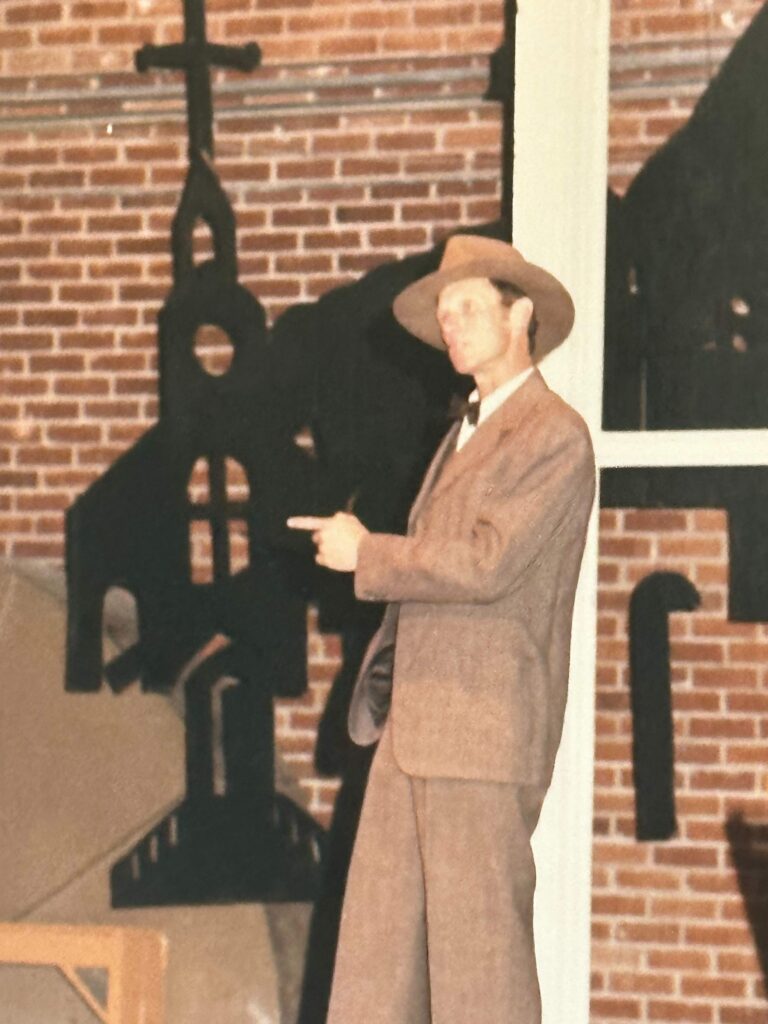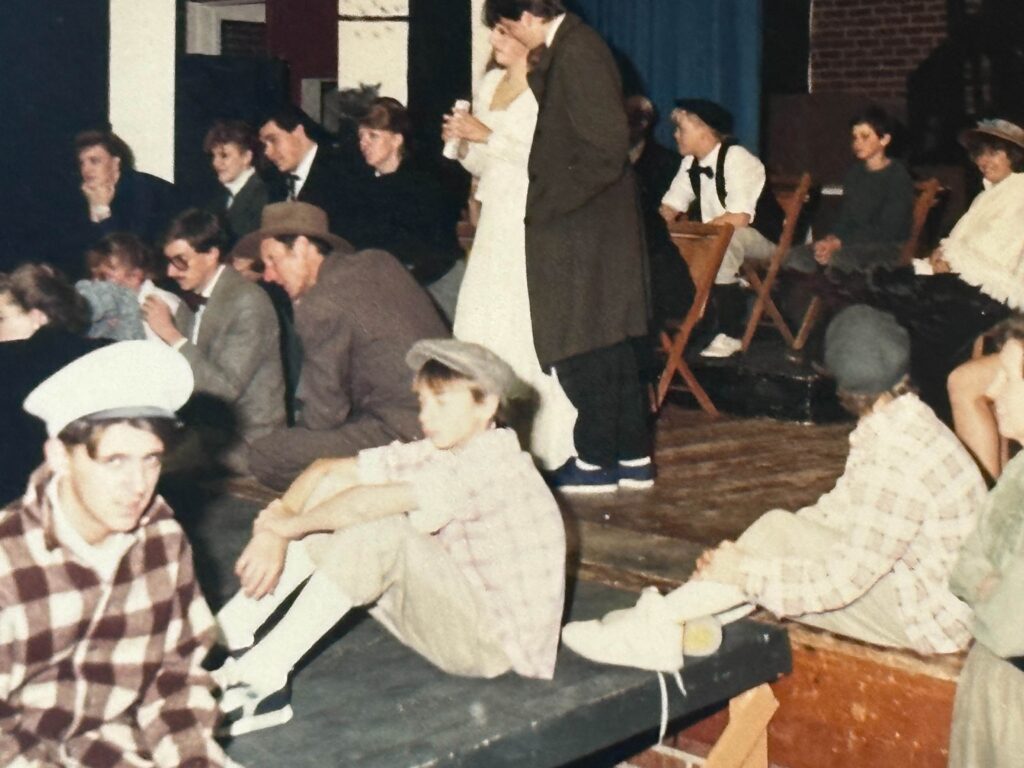Jeff Garrison
Mayberry Presbyterian Church
100th Anniversary ServiceJune 13, 2025
Joshua 5:8-12
NOTE: Because of the special celebration concluding Mayberry’s 100th year, I will only be preaching at Mayberry today. Elder Karen Motsinger will preach at Bluemont. Mayberry began its 100th year last September as we celebrated our 100th year as a congregation meeting in the Old Mayberry School House. We end the celebration today, recalling our 100th anniversary of moving into the church building in July 1925.
At the beginning of worship:
100 years. That’s a long time ago. None of us were here in 1925 when the congregation moved into this building.100 might be the age some inspire to live, but only a few make it. I’m sure those who built this church building a 100 years ago couldn’t comprehend us celebrating their achievements today any more than we can comprehend such a gathering in 2125.
But in some ways, 100 years doesn’t seem that long ago. Our nation is nearly 250 years old. When our spiritual ancestors moved into this building, our nation’s centennial was a distant memory and probably few remembered it. And our Christian faith is 2000 years old, 8 times older than our nation and 20 times older than this building. In light of eternity, 100 years ain’t even a drop in the bucket.
Time keeps marching on. Over the past year, with our Mayberry moments,[1] we have learned more about our congregation’s history. Our beginnings went back before this building, from a gathering under a brush arbor to a Sunday school meeting in the old schoolhouse which used to sit in what’s now the parking lot of our community building. We’re heard about the nearby farm boys running up to church early on winter mornings to light a fire in the potbelly stove. There were difficult years after the 2nd World War. Attendance declined and the building became a chapel under Slate Mountain Presbyterian. Then, in the 1970s, we regained momentum and became independent again.
In 100 years, we’ve had ups and downs. A lot of good people have joined the church. We’ve had joyous weddings but also sad funerals. But through it all, God has been with us. We’re not to take credit for any success, but to give credit to the Almighty.
Before reading the Scripture:
We’re going to go back into the Old Testament today. Our passage comes at the point when Israel enters the Promised Land. The Hebrew people recall who they are and to whom they belong. It’s a transition, an occasion for religious rituals and feasts. The fifth chapter of Joshua begins with the circumcision of the men, resuming a practice that had not happened during the wilderness. Then they celebrate Passover.
Interestingly, there are six major Passover celebrations recorded in the Hebrew Scriptures. The first is in Egypt, right before they left. The second is a year later, at Sinai, with the giving of the law. This is the third celebration. The fourth and fifth celebrations come with King Hezekiah and Josiah as they try to reform Israel. The sixth celebration is at the rebuilding of the temple after the Babylonian exile. Each of these events marks a significant point in Israel’s history.[2]
If you want to play with numbers, the number seven in Scripture is holy. We’ve seen that recently in my sermons on Revelation. Jesus celebrated the Passover with the disciples and reinterpreted it. Jesus then becomes the sacrificial lamb, as God passes over our sins for which Jesus paid the price. Jesus’ Passover makes seven.
As I’ve said, our morning text comes at a time of transition, the ending of the Exodus and the entry into the Promised Land. There will be no turning back. God has led them this far, now they are having to do something for themselves. The manna from heaven has come to an end. God calls them into the future. Likewise, God calls us into the future, into our second hundred years.
Read Joshua 5:8-12
All of us go through transitions—as individuals and as communities. One day we’re happy in school and the next we’re working 9 to 5 (or 11 to 7 in my case, for when I finished college I went straight onto the night shift). One day we’re enjoying our mom’s cooking and the next we’re eating burnt toast and running eggs prepared with our own hands. And one day we’re going to work and the next we’re retired. One day people walked or rode a horse to church and now everyone arrives in cars. Life is full of changes: always has been, always will be.
The Hebrew people went through a significant transition. After 400 years of slavery and 40 years of wandering in the desert, they finally enter the land promised to Abraham and his descendants. Now they’ve come to their new home, two things happen. They are weaned from God’s daily providence of substance and once again required, as we’re told in the third chapter of Genesis, to make a living from the sweat of their brow.[3]
Second, they’re finally able to freely institute religious rituals without being harassed by their masters’ or prohibited from doing due to their wandering in the desert. This transition is marked by the reinstitution of circumcision and the celebration of Passover.
Today, the church in America and the Western World faces changes. We must relearn what it means to be a follower of Jesus in a new and radically different world from which we’ve known. We must learn how to share Jesus in a new way which will reach a new generation who approaches life differently. Yes, we’re facing transitions. But the one thing that never changes is the love of God and the command to love others.
You remember, I’m sure, the story of how Israel got to where she’s at in our reading. After the freeing of the Hebrew people from slavery, they cross the sea, which closes in and drowns the pursing Egyptian army. But even after that, they remain in a precarious position.
Yes, they’re free, but how do you feed a nation in a barren wilderness? In Egypt, they’d filled their stomach on grains and meat but in the desert, the pickings are slim. There aren’t that many mountain goats and fried cactus for dinner doesn’t go over very well. There’s this small problem of having toothpicks hidden in the entrée.
But God isn’t going to lose his redeemed people, so he provides for their nourishment. A bread-like substance called manna falls from the heavens onto the ground. In the mornings they gather enough for that day, but if they try to hoard any extra, it spoils. It’s not a commodity to be saved and traded with others. The only day they can “collect” an extra measure is the day before the Sabbath, when they need enough for two days.[4]
Yet, they soon tire of eating this stuff. So, God provides quails for meat.[5] And so, for forty years, their diet consisted of manna and quail, provided through an ultra-efficient food delivery system, fresh right outside their tents every morning. Life isn’t hard and they get used to it.
But all things must come to an end and so it is with the manna and quail. Upon entering the Promised Land, the Hebrew people hold a Passover feast and from then on work for their daily bread. God’s ultimate welfare system is replaced, and everyone is required to follow a plow or chop weeds. God provides fertile soil and rain, but God also wants us to grow to where we can take responsibility and do our part in working within creation.
Erich Fromm wrote a wonderful philosophical treatise titled, The Art of Loving. I assure you; the book isn’t as risqué as it sounds. Fromm draws from scripture as he writes about “motherly love.” God creates the world and humanity. Within the world God provides our basic needs, but God goes further and declares, “It is good.” This corresponds with “motherly love” by providing for our needs and helping us to experience the joy of life. With the Promised Land, flowing with milk and honey, we have additional signs of motherly love—milk to nourish and honey to remind us of the sweetness of life. God says to Israel through the Prophet Isaiah, “As a mother comforts her child, so I will comfort you.”[6]
Yet, motherly love is built on inequality. The infant child is totally dependent on the mother. Motherly love must grow and change as the child grows. If the child is to become a separate human being and able to express love to others, the mother can’t continue to provide for all his or her needs. In addition to motherly love, Fromm speaks of brotherly and erotic love which, unlike motherly love, exists in its finest form between equals.[7]
God provides for the Israelites in the wilderness in a very special way. But the free food wasn’t to continue. For once God provides them with a homeland, they’re required to participate with God as co-creators as they toil to raise their food. Of course, God doesn’t lead them into the land and abandon them, just as God doesn’t abandon us. God remains at their side. Having protected and provided for them during the wilderness, they can now fulfill the role which God had destined for them.
God wants us to mature, to get to a point we can be responsible and take care of ourselves and fully participate with him in the role assigned to us. When God carries us, as he did with the Hebrew children in the Exodus, we learn we are to depend on God. When God leads us to a new place where we can be productive, we shouldn’t forget that lesson but instead give God thanks for giving us the means to take care of ourselves.
Those of us here at Mayberry have seen evidence of God providing and being with us throughout the past century.
But God doesn’t call us to rest upon our laurels. So, this morning we should ask how we can use what God has given us to continue partner with God. We have been blessed and for that we should give God thanks as we serve as a blessing to others. As the church moves into our second century, let’s remember to work not just for our own wellbeing, but for the wellbeing of those within our community, near and far. God has provided what we need. It’s up to us to make a difference. Amen.
[1] To read these moments, check out the Mayberry Presbyterian Church’s Facebook page. See https://www.facebook.com/littlechurchdoingbigthings
[2] E. John Hamlin, Joshua: Inheriting the Land (Grand Rapids: Eerdmans, 1983), 36-37. Text for the other five celebrations in the Old Testament: Exodus 12:27-29, Numbers 9:5, 2 Chronicles 30, 2 Kings 23:21-23, Ezra 6:19-20
[3] Genesis 3:19.
[4] See Exodus 16 and Numbers 11.
[5] Exodus 16:13 and Numbers 11:31
[6] Isaiah 66:13
[7] Erich Fromm, The Art of Loving (1956, Harper&Row, Perennial Library, 1974), 41-44.




